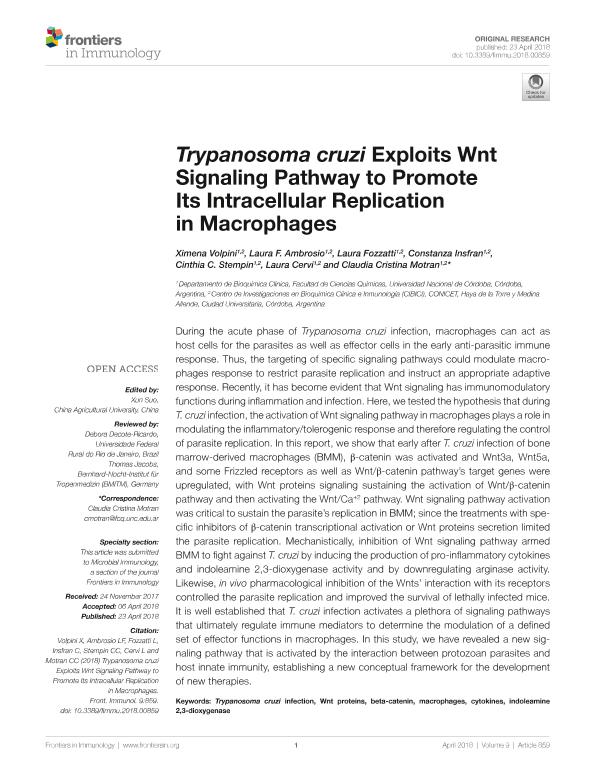Mostrar el registro sencillo del ítem
dc.contributor.author
Volpini, Ximena

dc.contributor.author
Ambrosio, Laura Fernanda

dc.contributor.author
Fozzatti, Laura

dc.contributor.author
Insfran, Constanza

dc.contributor.author
Stempin, Cinthia

dc.contributor.author
Cervi, Laura Alejandra

dc.contributor.author
Motran, Claudia Cristina

dc.date.available
2020-01-27T19:23:46Z
dc.date.issued
2018-04
dc.identifier.citation
Volpini, Ximena; Ambrosio, Laura Fernanda; Fozzatti, Laura; Insfran, Constanza; Stempin, Cinthia; et al.; Trypanosoma cruzi Exploits Wnt Signaling Pathway to Promote Their Intracellular Replication in Macrophages; Frontiers Media S.A.; Frontiers in Immunology; 9; 4-2018; 1-12
dc.identifier.issn
1664-3224
dc.identifier.uri
http://hdl.handle.net/11336/95894
dc.description.abstract
During the acute phase of Trypanosoma cruzi infection, macrophages can act as host cells for the parasites as well as effector cells in the early anti-parasitic immune response. Thus, the targeting of specific signaling pathways could modulate macrophages response to restrict parasite replication and instruct an appropriate adaptive response. Recently, it has become evident that Wnt signaling has immunomodulatory functions during inflammation and infection. Here, we tested the hypothesis that during T. cruzi infection, the activation of Wnt signaling pathway in macrophages plays a role in modulating the inflammatory/tolerogenic response and therefore regulating the control of parasite replication. In this report, we show that early after T. cruzi infection of bone marrow-derived macrophages (BMM), β-catenin was activated and Wnt3a, Wnt5a, and some Frizzled receptors as well as Wnt/β-catenin pathway's target genes were upregulated, with Wnt proteins signaling sustaining the activation of Wnt/β-catenin pathway and then activating the Wnt/Ca+2 pathway. Wnt signaling pathway activation was critical to sustain the parasite's replication in BMM; since the treatments with specific inhibitors of β-catenin transcriptional activation or Wnt proteins secretion limited the parasite replication. Mechanistically, inhibition of Wnt signaling pathway armed BMM to fight against T. cruzi by inducing the production of pro-inflammatory cytokines and indoleamine 2,3-dioxygenase activity and by downregulating arginase activity. Likewise, in vivo pharmacological inhibition of the Wnts' interaction with its receptors controlled the parasite replication and improved the survival of lethally infected mice. It is well established that T. cruzi infection activates a plethora of signaling pathways that ultimately regulate immune mediators to determine the modulation of a defined set of effector functions in macrophages. In this study, we have revealed a new signaling pathway that is activated by the interaction between protozoan parasites and host innate immunity, establishing a new conceptual framework for the development of new therapies.
dc.format
application/pdf
dc.language.iso
eng
dc.publisher
Frontiers Media S.A.

dc.rights
info:eu-repo/semantics/openAccess
dc.rights.uri
https://creativecommons.org/licenses/by/2.5/ar/
dc.subject
BETA-CATENIN
dc.subject
CYTOKINES
dc.subject
INDOLEAMINE 2,3-DIOXYGENASE
dc.subject
MACROPHAGES
dc.subject
TRYPANOSOMA CRUZI INFECTION
dc.subject
WNT PROTEINS
dc.subject.classification
Enfermedades Infecciosas

dc.subject.classification
Ciencias de la Salud

dc.subject.classification
CIENCIAS MÉDICAS Y DE LA SALUD

dc.title
Trypanosoma cruzi Exploits Wnt Signaling Pathway to Promote Their Intracellular Replication in Macrophages
dc.type
info:eu-repo/semantics/article
dc.type
info:ar-repo/semantics/artículo
dc.type
info:eu-repo/semantics/publishedVersion
dc.date.updated
2019-10-22T16:37:52Z
dc.journal.volume
9
dc.journal.pagination
1-12
dc.journal.pais
Suiza

dc.journal.ciudad
Lausana
dc.description.fil
Fil: Volpini, Ximena. Consejo Nacional de Investigaciones Científicas y Técnicas. Centro Científico Tecnológico Córdoba. Centro de Investigaciones en Bioquímica Clínica e Inmunología; Argentina
dc.description.fil
Fil: Ambrosio, Laura Fernanda. Consejo Nacional de Investigaciones Científicas y Técnicas. Centro Científico Tecnológico Córdoba. Centro de Investigaciones en Bioquímica Clínica e Inmunología; Argentina
dc.description.fil
Fil: Fozzatti, Laura. Consejo Nacional de Investigaciones Científicas y Técnicas. Centro Científico Tecnológico Córdoba. Centro de Investigaciones en Bioquímica Clínica e Inmunología; Argentina
dc.description.fil
Fil: Insfran, Constanza. Consejo Nacional de Investigaciones Científicas y Técnicas. Centro Científico Tecnológico Córdoba. Centro de Investigaciones en Bioquímica Clínica e Inmunología; Argentina
dc.description.fil
Fil: Stempin, Cinthia. Consejo Nacional de Investigaciones Científicas y Técnicas. Centro Científico Tecnológico Córdoba. Centro de Investigaciones en Bioquímica Clínica e Inmunología; Argentina
dc.description.fil
Fil: Cervi, Laura Alejandra. Consejo Nacional de Investigaciones Científicas y Técnicas. Centro Científico Tecnológico Córdoba. Centro de Investigaciones en Bioquímica Clínica e Inmunología; Argentina
dc.description.fil
Fil: Motran, Claudia Cristina. Consejo Nacional de Investigaciones Científicas y Técnicas. Centro Científico Tecnológico Córdoba. Centro de Investigaciones en Bioquímica Clínica e Inmunología; Argentina
dc.journal.title
Frontiers in Immunology
dc.relation.alternativeid
info:eu-repo/semantics/altIdentifier/url/http://journal.frontiersin.org/article/10.3389/fimmu.2018.00859/full
dc.relation.alternativeid
info:eu-repo/semantics/altIdentifier/doi/https://doi.org/10.3389/fimmu.2018.00859
Archivos asociados
